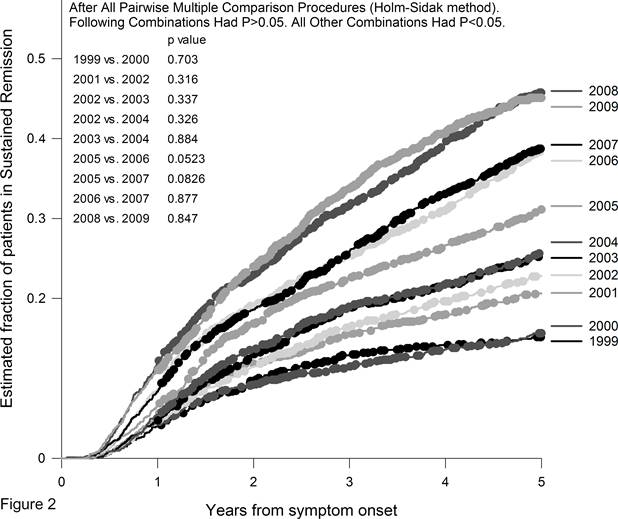Session Information
Session Type: ACR Poster Session C
Session Time: 9:00AM-11:00AM
Background/Purpose: Remission has become a treatment goal in rheumatoid arthritis (RA) especially after the introduction of biologic treatment in 1999. The Swedish quality registry (SRQ) is a nationwide registry for rheumatic diseases in which all 64 rheumatology units in the country participate. The aim of the present study was to investigate the impact of changing treatment goals in the national guidelines on secular trends in achieving sustained remission (SR) i.e. DAS28<2.6 on at least 2 consecutive occasions lasting at least 6 months in a national Swedish RA cohort.
Methods: All adult patients with RA included in the registry 1992-2013, with follow up through 2014 with at least 3 registered visits were eligible, a total of 29084 patients. Their median age was 59.6 years and 72% were female. Symptom onset ranged from 1934 to December 2012, but for parts of the comparisons only patients with symptom onset between 1999 and 2009 were studied. The median time from symptom onset to inclusion was 2.6 years (range 0-78 years). Last follow up visit was median 10.5 years after symptom onset. In total, 95% of patients fulfilled the ACR 1987 classification criteria for RA and 73.2% were ACPA positive. Registrations were made with a median interval of 6 months (range 1 to 215). Duration of remission was defined as the time between first visit fulfilling the remission criteria and subsequent first visit with higher disease activity, after median 2.8 years. Estimated time to SR for each year was calculated with life table analysis and compared using log-rank test.
Results: 12193 (41.9%) patients reached DAS28 sustained remission at some time point during follow up. Figure 1 shows the fraction of patients with symptom onset in a certain calendar year reaching DAS28 remission occasionally or SR. Of patients with symptom onset between 1981-1990, 1991-2000 and 2001-2010, 35.0%, 43.0% and 45.6% reached SR respectively (p<0.001 for each increment). Figure 2 shows the estimated fraction of patients in SR during the first 5 years after symptom onset. The time period from symptom onset to SR decreased every other year with only two exceptions (p<0.001; log-rank test). The estimated mean time to SR was 11.7 years in 1999 compared to 4.2 in 2009.
Conclusion: The prevalence of sustained remission was higher 2001-2010 compared to the previous two decades. Time from onset of RA symptoms to sustained remission decreased gradually between 1999 and 2009. The treatment strategy the last decade has improved outcome of RA but further improvement concerning time to diagnosis and early effective treatment is required to reach the treatment goal of sustained remission in the majority of patients. 
To cite this abstract in AMA style:
Einarsson JT, Willim M, Ernestam S, Saxne T, Geborek P, Kapetanovic MC. Secular Trends of Sustained Remission in Rheumatoid Arthritis, a Nationwide Register Study in Sweden [abstract]. Arthritis Rheumatol. 2016; 68 (suppl 10). https://acrabstracts.org/abstract/secular-trends-of-sustained-remission-in-rheumatoid-arthritis-a-nationwide-register-study-in-sweden/. Accessed .« Back to 2016 ACR/ARHP Annual Meeting
ACR Meeting Abstracts - https://acrabstracts.org/abstract/secular-trends-of-sustained-remission-in-rheumatoid-arthritis-a-nationwide-register-study-in-sweden/

